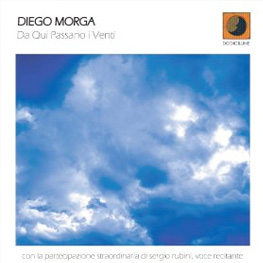Qui passano i venti
- Da Qui Passano i Venti
- Un Ricordo di Te
- Il Canto
- A Ludovico
- Di Danze e di Castelli
- Poi Ti Dirò
- Salto a Sud*
- Obsesso
- Piove
- Mentre Ti Guardo
- Voci
- Sulla Via del Ritorno
Music by Diego Morga
Diego Morga – piano, compositions, arrangements, production
Guests:
Sergio Rubini – acting voice (tr. 3)
Ferruccio Spinetti – contrabass (tr. 7)
Emanuela Lioy – violin (tr. 3, 5, 10)
Roberto Ottaviano – soprano sax (tr. 3)
Pippo D’Ambrosio – percussion (tr. 3)
Graziana Aceto – violin (tr. 3)
Giuseppe Piccininni – viola (tr. 3)
Emanuele Manzo – cello (tr. 3)
Recordings by Gennaro Mele at "Pentagramma" studio (january - april 2007)
*Salto a Sud recorded by Angelo Pantaleo at "Tom Tom mobile studio" (march 2005)
Mix and mastering by Gennaro Mele at "Pentagramma" studio - Bari
Cover foto by di Pedro
" Diego Morga defies easy classifications. He loves jazz but practically doesn't play it anymore; he frequents eccentric characters such as the songwriter Angelo Ruggiero, writes for dance and theater, cultivates the art of improvisation but admires some post-minimalist composers (such as Nyman and Win Mertens). In short, a musician who must be listened to without prejudice. "Da qui passano i venti" is a mature work: the twelve tracks that compose it, all original compositions and all very "written", are as many themes for imaginary films, sound environments that refer to the idea of the musique d’ameublement but do not let themselves be trapped. The piano is the center of everything, but there is no lack of contributions from other instrumental voices here and there: the double bass by Ferruccio Spinetti, the violin by Emanuela Lioy. In "Il Canto" the scene is populated unexpectedly: here is the acting voice of Sergio Rubini, who declaims verses of lost love by Neruda, the soprano sax by Roberto Ottaviano which is produced in an extremely lyrical solo, and again the percussion by Pippo Ark D’Ambrosio and a complete string quartet. Then there is a solo piano piece, "To Ludovico", which makes you think (correctly) of Einaudi. But it is not a question of plagiarism or a pimp; rather, an open letter with subtly polemical intentions. Music doesn't speak. But it is sometimes more eloquent than many words. "
Bari, 10 october 2007. Fabrizio Versienti
- Copyright 2021 diegomorga - all rights reserved
